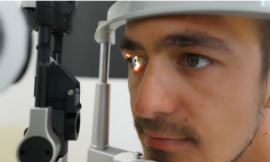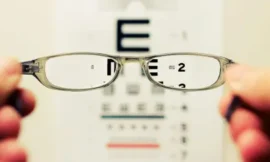I can’t imagine what a blessing it should be to be expecting a child. Every woman with a vision impairment ought to think about LASIK before pregnancy. An ophthalmologist wouldn’t suggest undergoing LASIK before or immediately after pregnancy.
In the United States, around 7 million refractive treatments are performed every year to provide patients with clear and enhanced vision. 30% of pregnant women struggle with the shift in refractive value, which might cause difficulty seeing objects. People spend billions of dollars on various ocular procedures to improve their vision.
Let’s start with the basics, like, “Can I get LASIK before pregnancy?” Explore the impact of pregnancy on corneal thickness, curvature, and tear formation, as well as how these factors affect a pregnant woman’s eyesight.
Eye Refractive Value during Pregnancy
In LASIK eye treatment, an ophthalmologist will create a corneal flap via a laser to fix the refractive error that may occur in elderly or pregnant women or earlier in some individuals. The main thing that affects vision is the refractive value, which may fluctuate during pregnancy. There should be variation in water retention and corneal thickness. It will cause a decrease in tear production, which then causes dry eyes.
Progesterone and estrogen are the hormones that alter refractive properties, and during pregnancy, these hormones are produced at higher levels. In expected females, hormonal fluctuations will cause nausea, water retention, and the condition known as keratoconjunctivitis sicca.
Can I Get LASIK Before Pregnancy? Explain

LASIK surgery is ideal for treating eye conditions like myopia, hyperopia, and astigmatism. A recent American study on LASIK before pregnancy found that a woman should consider the hormonal changes that will occur throughout the pregnancy, which will affect the corneal composition and structure.
Health professionals encourage staying comfortable during pregnancy to avoid complications, but wearing eyewear such as glasses and contact lenses makes the expectant mother uncomfortable. It may also worsen existing eye issues such as hazy vision and dry eyes.
Pre-pregnancy LASIK is an excellent alternative If a pregnant woman is having vision problems and wants to stay healthy or avoid eye strain. The eyewear trend changes during pregnancy because hormonal changes occur regularly, as does the ocular prescription.
Consider LASIK at least 6-8 months before pregnancy to avoid any changes that will affect your eye health like changes in
- Corneal curvature,
- Corneal thickness, and
- Aqueous humour production via lacrimal gland.
So, get LASIK before pregnancy after consulting with your eye doctor at his LASIK centre or via teleconsultation.
Does Pregnancy Affect Vision After LASIK?
Yes, pregnancy affects post-LASIK vision. The vision changes when you have a hormone imbalance, whether due to mental stress or menstruation symptoms.
Rather than not discussing your conditions with the doctor, it is preferable to make this decision immediately, following a consultation, on whether you should get LASIK after breastfeeding or after pregnancy.
LASIK Enhancement After Giving Birth:
If you undergo vision correction surgery (LASIK) and do not wait for complete recovery, you are more likely to require a LASIK enhancement operation after giving birth to the baby.
Variations in progesterone and estrogen levels that are connected to the cornea, as well as fluctuations in the lacrimal gland’s production of aqueous humour, can result in dry eyes and other eye disorders.
Extensive research is being conducted on the medications administered to patients following LASIK, which may interfere with the pregnancy phase. Approximately 10% of pregnant women suffer from vision problems.
Does LASIK Affect Fertility?
LASIK won’t affect fertility, however, the medications used for corneal rehabilitation will. Certain medical conditions that can occur after pregnancy will determine whether you are an excellent candidate for LASIK surgery or not.
Diabetes and pre-eclampsia are typical post-pregnancy complications. If you have diabetes, ophthalmologists urge that you do not have LASIK.
Is It Good to Get LASIK Surgery After Pregnancy and Breastfeeding?
Yes, LASIK can be performed after LASIK and nursing. The eye doctor will examine the patient’s medical condition and prescribe how long she would have to wait to get LASIK after pregnancy. If she is breastfeeding her infant, her hormonal imbalance will resolve sooner, and she will be able to have LASIK within two months.
The refractive value will stabilize in approximately 1.5 months, and you can consider LASIK (using Alcon wavelength refractive lasers) to improve your vision with no or minimal pain.
If you are not healthy enough and are not breastfeeding your child, you should rest enough to allow your health to return to normal before considering vision correction surgery. You should be thinking, “How long does it take to become pregnant after LASIK surgery?” Most ophthalmologists recommend waiting 9-10 months so your body’s hormones can balance and your cornea can heal faster.
FAQ’s: LASIK After Pregnancy
Can I give natural birth after LASIK?
Yes, after LASIK, you can give birth to a baby naturally. Parturition will not be affected by LASIK because it involves corneal reshaping.
Why can’t you breastfeed with LASIK?
With LASIK, you cannot breastfeed. The reason behind this is that the medications given by the ophthalmologist get absorbed into the bloodstream and subsequently passed into breast milk which will affect your newborn child.
Why can’t you cry after LASIK?
If you are emotionally overwhelmed, you can cry after LASIK because tears will not cause infections, irritations or impede corneal healing.
Can LASIK laser affect getting pregnant?
LASIK lasers will have nothing to do with the pregnancy organs. There is no study observed that shows the effect of LASIK on becoming pregnant and on the newborn in the mom’s belly.
References:
- Moshirfar, M., Rosen, et, al. (2019). Should I get LASIK if I’m breastfeeding? Ophthalmology and Therapy, 8(3), 349–352.
- LASIK and pregnancy – EyeWiki. (n.d.).




